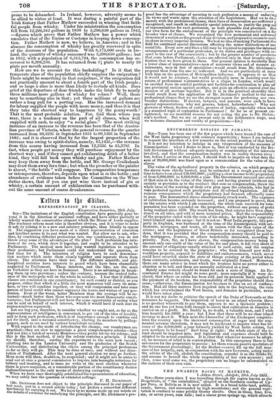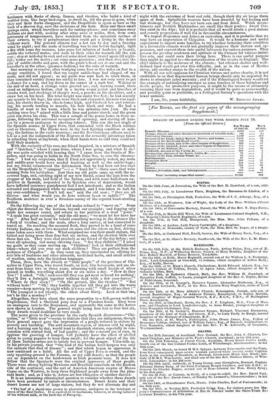Tall DWARFED RACES OF MANKIND.
1 Adam Street, Addphi, 1911s July 18453. Sin—Some years since I was travelling through the region known as the Despoblado, or "the uninhabited," situated on the Southern confine of Up- per Peru, or Bolivia as it is now called. It is a broad table-land, pebbly, sandy, barren, and surrounded by high mountains; and the general vege- tation is confined to some prickly thorny shrubs. Once in three, four, five, six, or seven years, rain falls; ends coarse grass springs up, which attracts herdsmen with flocks of sheep, llamas, and vieufias, who build a kind of wattled huts, like large bird-cages, to dwell in, till the grass is gone, when they and their flocks disappear, and the Despoblado is again as re as the back of a shaven dog, save the skeletons of the huts. Here and there small springs exist, which travellers seek for resting-places; and sometimes stray Indians are met with, seeking after stray asses or mules, that, from some perversity of temperament, have wandered from the mountain ravines of their owners, to try if peradventure they could get a living in the desert without work. The general climate was a hot sun by day and ft freezing wind by night ; and the mode of travelling was to rise before daylight, light a fire with some dry manure, take some hot infusion of herb-tea or brandy, saddle the tethered mules, and walk by their sides for warmth till the sun rose ; stop at mid-day to cook and eat some dried meat ; travel again till night- fall ; tether out the mules ; eat some more provision ; and then dive into the pile "of saddle-cloths and gear, with the guide's head out at one end and the traveller's at the other, (guanaco fashion,) for the sake of warmth.
One morning at sunrise, after trudging some four or five miles on foot in a sleepy condition, I found that my carpet saddle-bags had slipped off my mule, and did not appear ; so any guide was sent back to truck them, as they contained sundry items too useful to lose. I was not very sorry to get a chance for a nap, and lay down in the corner of a rush hut. Wakinz at the end of an hour, a strange voice greeted ; and, turning round, there stood an indigenous Indian, clad in a brown round jacket and breeches of vicuna wool, and stockings of sheep's wool, a poncho on his shoulders, and a straw hat on his head. His total height was under five feet; he had scarcely any muscle to his legs; his eyes were black and elongated, his nose was aqui- line, his cheeks drawn in, cheek-bones high, and forehead low and retreat- ing, his mouth tending to muzzle, his hair black and wiry. He had a bundle of wool at his waist, which he was spinning into yarn. He was sucking toca-leal • mixed with a little lime and potato-starch, and the green juice ran down his chin. This was a sample of the genus home in those re- gions, following the universal occupation of spinning, and staving off hun- ger by a process analogous to chewing tobacco. This was the raw staple of the Spanish armies in Upper Peru, that contended with the Black soldiers sent as liberators. The Blacks were in the best fighting condition at mid- day, the Indians in the early morning; and the Revolutionary officers used to tell as a jest the indignation of the Negroes at the cowardly advantage taken in attacking them at daybreak, when their hands were so cold they could not hold their muskets.
With the curiosity of his race, any friend inquired, in a mixture of Spanish and " Quiehua," where I came from, where I was going, and what to do ? He was quite satisfied with hearing that " I came from the Straits of Ma- gellan, and was going to bathe in the North Polar Sea, to cure the rheuma- tism." I had my suspicions, that if I had not opportunely waked, my mule and saddle-gear would have needed tracking as well as the saddle-bags ; but my friend volunteered the information that he had been out two days on the Despohlado to " campear "—i. e. " hunt for"—three asses that were missing from his habitation. Just then my old guide came up with the re- covered bags, and, catching sight of my new friend, seized the laze from the crupper of his mule, laid hold of the Indian, and with some half-dozen ex pletives in Spanish, responded to by Quichua cries of deprecation, would have inflicted summary punishment had I not interfered ; and so the Indian retreated and disappeared while we remounted, and I was taken to task for any over-confidence. "Don't tell me," said the old man ; "they are all thieves: and what would you do here without beast or saddle ? " The Southern muleteer is ever a ferocious enemy of the reputed beast-stealing Indian. • On the following day one of the led mules refused to "move on." Some object she descried on the horizon, beyond our eyesight ; and flogging only made her scamper round, and return to her position of a dead "point.' "A mule has g;reat curiosity," said the old man ; "we must let her have her way." After half an hour we beheld something moving in the distance like a flock of VICUILIS *, and the mule, after a long survey, at last consented to travel on. On reaching the assumed flock, they proved to be a band of some twenty Indians, one or two mounted on asses and the others on foot, driving some laden 3.3.9C6 with them. What surprised me was their small stature, the tallest not being more than four feet six inches, and the shortest little over three feet six. They were clad precisely as my friend of the day before; and were all spinning, and many. chewing coca. "Are they children ?" I asked any guide as they came moving up. "Children! look at their oldfashioned faces—where did you ever see such children ? They are pedlars from the prdyince of Chiquitos." As they came up, they surrounded us, offering for salbits of loadstone and other minerals, medicinal herbs, and small articles of woollen, using only the Quiehua language.
These, then, were the dwarfs or "little people" of the province of Chi- quitos in Upper Peru, who travel South, on foot, like Savoyards, and are ab- sent from home two or three years, returning with small hoards of silver gained in traffic, travelling about five or six miles a day. "How do they live !" I asked. " Oh ! suck coca till they can get meat or bread for nothing : they'll live a fortnight together without food with a few coca-leaves !" "Where do they sleep ?" "On the ground, like the vicunas!" "But 'without beds ? " " Oh ! they huddle together till they get into the warm country—keep moving by night while it's very cold !" "How old are they ? " "The youngest is not twenty, the oldest about thirty. Look at that one, isn't he like a monkey ?" Altogether, they bore about the same proportion to a full-grown well-fed Englishman, that a Shetland pony does to a Flanders horse. They were an analogous race to the Bosjesman, and apparently the same as the Aztecs now shown in London. The general staple being four feet to four feet six, their dwarfs would doubtless be very small.
The name given to the province by the early Spanish discoverers—" Chi- quitos," or "little men"—seems to indicate that they are indigenous, though thew general aspect gave the impression of a people reduced in stature by poverty and hardship. The arid mountain region, of intense cold by night, and &burning sun by day, would tend to diminish stature, especially in con- junction with stinted food, of bad quality ; and the constant use of coca, to appease 'the gnawing of hunger, will probably have the effect of alcohol given to young puppies to keep them small ; for the great object of the life of these Indians seems not to satisfy but to prevent hunger. 171loa tells us, in his private journal, that "the food of the Indian herd-keepers was only the animals that died of disease" ; and that which began in oppression is now continued as a habit. All the soil of Upper Peru is owned, and the only squatting-ground is the Paramo, or dry cold desert ; so that the people are as dependent on the landowners as Irish peasants were. It does not follow that the Spaniards were the original oppressors of these people. There were strong fighting Mexicans and Brazilian cannibals on the Eastern side of the continent, and the sort of Assyrian American empire of Mance Capae on the Western, to keep these frightened people away from the plea- sant lands ; and, as I take it, Aztecs are but Chiquitos of another district.
It is an interesting ethnological question to consider whether these dwarfs have been produced by nature or circumstances. Desert Arabs and their desert horses are not of large stature, but they do not alternate day and
Theleaf of a shrub-tree grown in plantations, analogous to the betel-nut or areca of the East Indies. It is equivalent to laudanum, tobacco, or strong infusion of tea without milk, or the herb-tea of Paraguay.
night with the extremes of heat and cold, though their dry air keeps them spare of flesh. Spitalfields weavers have been dwarfed by bad feeding and bad drainage, but they have not been sun and frost dried. Welsh moun- taineers and Scottish Highlanders are small like their ponies ; dwarf Cre- tins exist in the Alps; but it is probable that all would attain a good stature and comely proportions if well fed in favourable circumstances.
We import Bosjesmen and Aztecs as curiosities, and it is probable that we may have an importation of Chiquitos. It would be a humane and useful experiment to import some families, to try whether bettering their condition in a favourable climate would not gradually improve their stature and ap- pearance, and convert them into useful labourers for various purposes.They possess the peculiar acuteness and aptitude of the Chinese for various imita- tive arts, and could earn their living here. There is one useful purpose they might be applied to—the naturalization of the vicuna in England. The chief obstacle is the moisture of the climate; but efficient shelter and well. drained land would get over this difficulty, and, as in the case of Merino sheep, add another source to the wealth of the nation. With all our self-applause for Christian virtues and active charity, it is not creditable to us that degenerated human beings should only be imported for shows to stimulate jaded curiosity; and if the Ethnological Society would set the example of naturalizing amongst us some families of these harmless and docile people, for productive purposes, it might be the means of ultimately rescuing their race from degradation, and it would be quite as praiseworthy, and possibly quite as profitable, as a Zoological Society's operations with the lower animals.



































 Previous page
Previous page